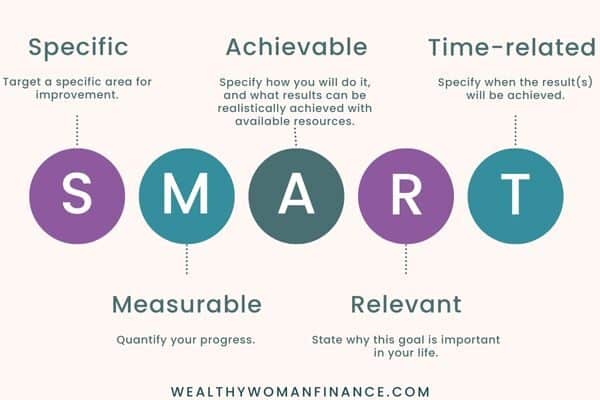What’s a Money Journal? + How It Can Supercharge Savings Now!

Use a money journal and mindset journaling prompts to get from where you are to where you want to be!
My 6th-grade son is a good kid. But he struggles immensely with remembering to do…just about anything.
So, we’ve talked a lot lately about writing things down. Putting pen to paper helps you remember – but it also makes you more aware and clarifies your thoughts.
This lesson is just as important for adults!
- How many bad habits do we repeat because we don’t see them?
- How often do we forget a bill because it gets lost in the shuffle?
- How many of us wander through life without clear financial goals?
What is a money journal?
A money journal is a practical tool that can take different forms, depending on what you need. Most importantly, it provides clarity on your financial habits, helps you recognize patterns, and improves your relationship with money.
Key Takeaway: A money journal makes you more likely to achieve financial goals, like a big home downpayment or a luxury vacation.
3 Incredible Ways to Use a Money Journal
Do you need to track expenses? Improve your mindset? Or get better at goal setting? You can use your money journal to address all of these.

1. To Set Clear Financial Goals
Research shows that you are 42% more likely to achieve your goals if you write them down. And yet, only 2 in 10 people even set goals for themselves (source). Don’t let this be you! Give yourself purpose, challenge, and drive. Set simple goals that get you moving to the life of your dreams.
First, write down long-term goals: Make a financial vision board. You can stick it right on the pages of your money journal. Where do you want to be in 5, 10, and even 20 years? See how it feels!

Next, break down your big dreams into shorter financial SMART goals. Make them as specific and action-based as possible. And give them an achievable deadline
These steps bring amazing clarity to what you want out of life. Instead of floating in the water, you’re now on a clear heading that’s taking you to a beautiful destination.
Don’t stop at one time! Use your journal to track your progress and adjust your goals. With consistency, your journal becomes an invaluable asset in achieving your financial dreams.
2. make it A Budgeting Money Journal
Use your money journal as a place to track your income and expenses. Using your money journal as a budgeting tool can be amazing for your day-to-day spending. It’s the same reason experts recommend counting calories for weight loss.
Tracking creates awareness. And awareness leads to progress.
3. Use it to Improve Your Money Mindset
Next, your money journal can uncover your blocks, clear out limiting money beliefs, and transform your mindset.
Thoughts drive words. Words turn into action. Action becomes habit.

25 Money Manifestation Journal Prompts
These money mindset journal prompts encourage deep reflection on your attitudes, spending habits, and long-term financial goals. They are designed to facilitate financial self-discovery and growth.
1. What are your long-term financial goals for the future?
2. Are you making progress toward these goals? In what way?
3. What is the biggest challenge to reaching your goals right now? How can you overcome it?
4. What steps are necessary to achieve your envisioned financial future? Now, what’s the very first step?
5. (If you have debt) What’s your debt repayment plan? Is being debt-free a goal?
Grab free debt payment trackers >>
6. Are you spending money on things that mean the most to you?
7. Does your lifestyle allow for work-life balance?
8. Consider one long-term goal: What’s the 3-month plan to make progress in reaching it? What about the 1 week plan? 1 day?
9. How do you measure success toward these goals?
10. What do you need to learn next to grow into the money manager you’d like to be?
11. If you had to rate your financial situation right now 1-10, what would it be? Why?
12. Where do you see your life in 5 years? Does your financial situation need to change to get there?
13. Do you use your money to help others? In what ways?
14. Identify one budget category you consistently overspend in. Why do you think this happens?
Related: How to Stop Overbuying
15. If you could spend 10x more on 1 thing what would it be?
16. If you had to stop spending entirely on 1 thing, what would it be?
17. What did you spend money on today that was truly necessary? What did you spend money on that wasn’t?
18. If you found out you had 6 months to live, what would you do with your time left?
19. Have you had any changes in your income this month, such as bonuses or overtime? If so, how does this affect what you do with your money?
20. What’s holding you back from reaching financial freedom?
21. Have you told yourself that you can’t do something recently? What was it about? Is that a limiting belief?
22. How can you cut back on (or cut out) a non-essential purchase tomorrow?
23. What is stopping you from investing in yourself? What is stopping you from investing in the market or real estate?
24. What are your top 3 financial goals for the next three months? How will you prioritize them?
25. What strategy will you implement to stay on budget next month?

26. If you lost all your money, what would you do?
27. What do you think of this phrase: “all debt is bad”?
28. How would you increase your income if you had to do it today?
29. Have you told yourself that you don’t know enough about something? How could you turn this thought around?
30. What is something your parents said about money growing up? Does it impact the way you see it today?
31. Are you trying to do too much? What’s one way you can simplify your life or spending this week?
32. If you had to create a side hustle or passive income stream today, what would it be?
33. What does success mean to you? Is it financial stability, career achievement, deep family connections, etc.?
34. Do you have any money mentors? Where could you find one?
35. What’s the highest priority in your life right now? How do money and time affect it?
36. Are you paying for something that you don’t use?
37. What is a bad experience you’ve had around money? How did it shape how you feel about money today?
38. What’s the lifestyle you want to live now?
39. What’s the lifestyle you want to live in retirement?
40. What are your next 1-3 steps to save more money this week?
41. What’s one limiting belief you have about money, and how can you flip it?
Examples: “I’m not good with money.”
42. Are you building wealth? (Is your bank account/portfolio growing every day?)
43. How do you want to use your money to do good in the world?
44. Are you saving a portion of your income? Could that amount be bigger or are you happy with where you’re at?
45. Do you have an emergency fund? How much is in it?
46. Do you track your net worth?
47. Do you track your daily, weekly, or monthly expenses?
48. Do you know your credit score? When was the last time you checked it?
49. Do you need a financial planner?
50. Are your savings and investing automated?
Best Practices for Money Journaling
BE CONSISTENT to ensure that your money journaling is powerful and insightful.

Update Your Money Journal at a Set Time
Pick every morning at a specific time to write in your journal. Or schedule once a week on a specific day. The clearer you can be, the better off you’ll be. It also helps tremendously to put it into a routine you already have built up.
For example, if you drink your morning coffee at 6 am, could you do your morning money journal while you wait for it to brew?
Be Honest With Yourself
No one else will look at this money diary. Therefore, the only one you’d be lying to is yourself. Being honest is a non-negotiable.
Avoid the Common Pitfall
Small expenses add up quickly. Plus, it’s easy to forget about them.
Yet by doing so, you’re not accounting for the true cost of your daily living. Make a habit of jotting down ALL expenses. No matter how trivial they seem.
Reviewing Your Journey is KEY
Here’s where the money journal really shines. Every month or quarter, review what you’ve written. Are you making progress? Where are your spending habits holding you down? Do you have specific triggers or temptations?
By reviewing and identifying patterns, you gain incredible insight.
Pro Tip: Schedule it in your calendar and set a reminder to pop up when it gets close!
Analyze Spending Trends
Consistent tracking will reveal spending patterns that otherwise go unnoticed. Utilize tables or charts to record weekly expenses and watch for trends over time. You’ll identify areas where you could cut back easily.
Make Adjustments
Because a money journal uncovers hidden truths, you’ll be able to catch when you’re off track and redirect before damage is done.
Ready for a finance transformation?
Use your money journal to improve your abundance mindset, track your habits, or get better at setting goals. By reflecting on your decisions and remembering your why, you’ll achieve more in a day than most people do in a month. Think of how amazing that’s going to feel!
Pro Tip: Adopt gratitude practices and other money mindset exercises to supercharge the effects of your money journaling.
What’s Next?
Next, find more ways to get active with your financial success:
- Build Strong Work Ethic Examples in your life
- Try the Quarter Savings Challenge to jumpstart savings habits
- Improve your know-how with these financial terms you might not know





